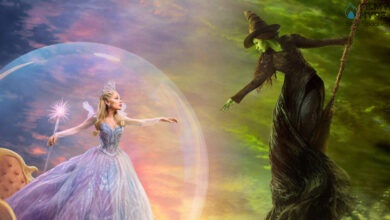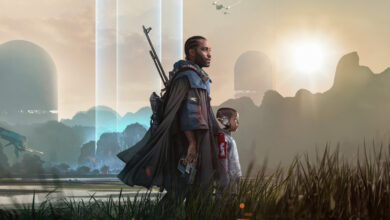Kingdom of the Planet of the Apes Review: I Travel Into A Reality That Is Increasingly Distant From The World Of Men
Cast: Owen Teague, Freya Allan, Kevin Durand, William H. Macy
Director: Wes Ball
Where to Watch: In Theaters
Filmyhype.com Ratings: 4/5 (four stars)
Kingdom of the Planet of the Apes gives new life to the reboot of the saga, and after the last two episodes directed by Matt Reeves, we are given a robust, humble film, not as perfect as the previous two, but with more than something to say and to give. Despite a script that is not so evil or narratively daring, there are many reflections and many conceptual surprises in this new chapter, which continues what this saga has been able to give to the science fiction genre since the end of the 1960s, but not only that, making history of the seventh art. Caesar is dead. Monkeys have evolved. Men have regressed into the wild (or almost). Nature has taken over. We are “many generations” away from the previous chapter’s events, and the world has now changed profoundly. So profoundly that Kingdom of the Planet of the Apes is something completely different compared to the three films that preceded it.
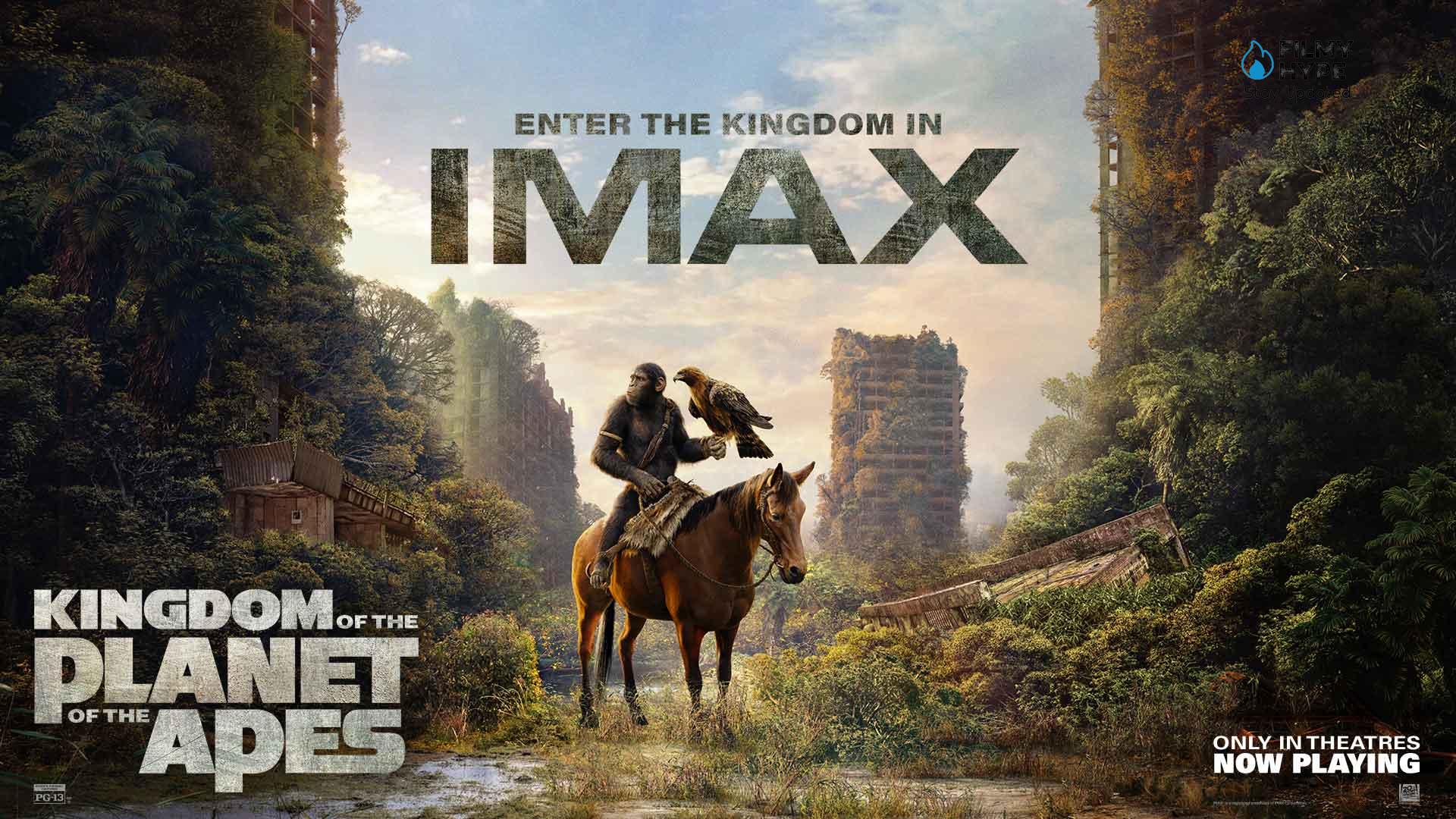
the connections with the reboot trilogy of the saga born in the Sixties are still there, but the very long period that elapsed between the last episode of the franchise and the one released at the cinema on May 8 makes them only distant memories, echoes of a past that few people truly know. Thus, Kingdom of the Planet of the Apes is a departure – perhaps the beginning of a second reboot trilogy, who knows – compared to the fixed points set with Rise of the Planet of the Apes (2011), Dawn of the Planet of the Apes (2014), and War for the Planet of the Apes (2017). Something completely new but also intimately connected to the past, right from the opening scene (which we won’t give any spoilers about, given that it is one of the most touching moments of the film). And it is precisely on this dialectic between past and present, as well as on the upheaval of everything we thought we knew about the world of sentient apes, that the film’s charm is built.
Kingdom of the Planet of the Apes Review: The Story Plot
Kingdom of the Planet of the Apes begins by showing us the funeral of Caesar, who in the previous episode (released in 2017) had managed to save his clan, but not the future he dreamed of, in which apes and humans would rebuild the world together. 300 years pass, and we meet the young chimpanzee Noa (Owen Teague), who together with the rest of his tribe, specialized in breeding and coexisting with golden eagles, lives peacefully and self-sufficiently. They are completely unaware of the terrible danger that is about to be unleashed against them. The village is attacked by warrior monkeys who respond to the will of Proximus (Kevin Durand), a Bili Monkey who has settled near the coast and who since then subdued with his army all the monkeys who cross his path, to use them as slaves in his Kingdom.
The young primate, however, does not give up and sets off in search of his tribe, who have been deported in chains. On his way, however, he will first find the wise orangutan Raka (Peter Macon) and above all the young human Mae (Freya Allan), who, unlike many of her peers, has not lost the use of words or her intellect. But that young girl knows much more than she wants to say, and great changes will come from that meeting. Kingdom of the Planet of the Apes is directed by Wes Ball (the one from the Maze Runner saga) and is written by Josh Friedman, who continues his path of distancing himself from the original saga of the 70s. However, Kingdom of the Planet of the Apes does not for this reason renounce references, both from the first films of the franchise and from many other cornerstones of the seventh art of the past.
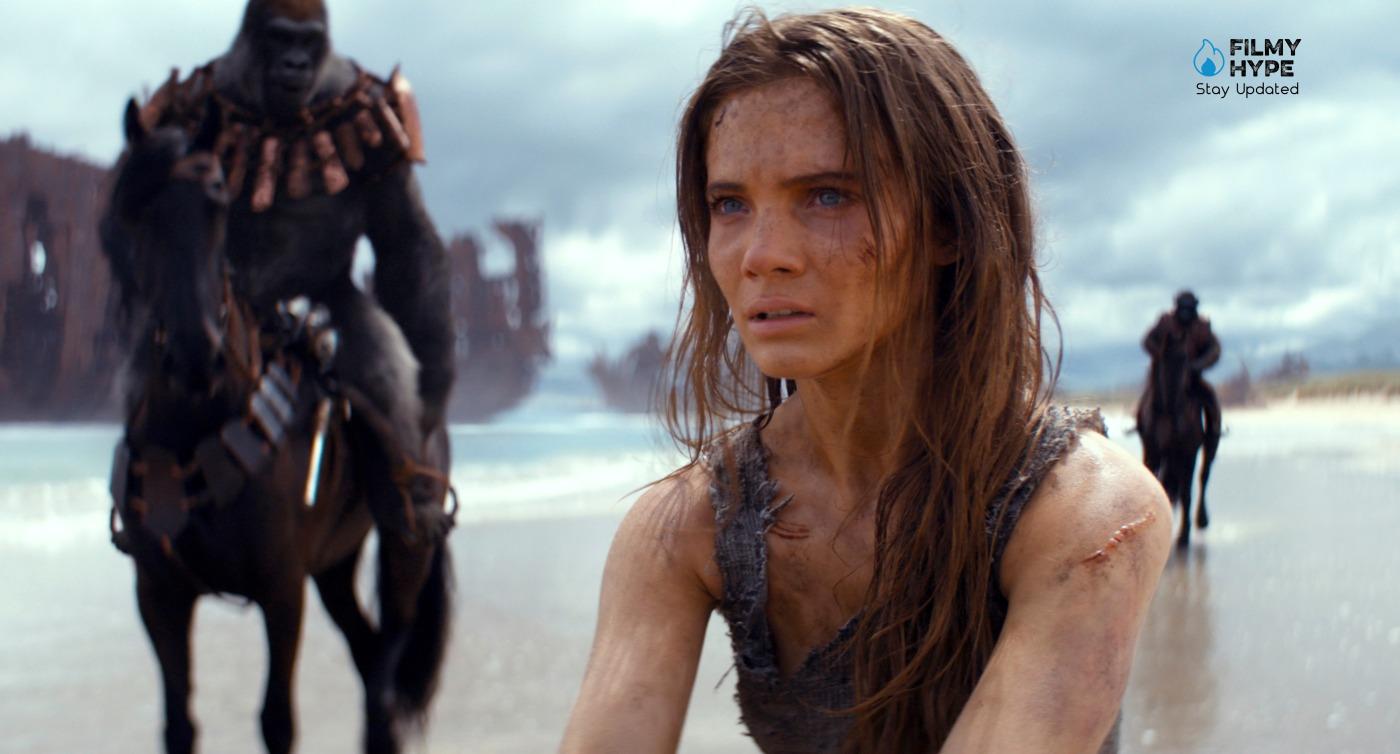
The references to Terminator, Conan the Barbarian, as well as the more modern post-apocalyptic genre are very clear. The final result is a much more intimate film than the previous ones, which has its cornerstones in the relationship between man and nature, in the analysis of the concept of leadership and social coexistence. Amazing in terms of special effects thanks to Wētā FX and the new Volume technology, it is a great visual spectacle, even if sometimes perhaps it leaves a little to be desired with regards to certain aspects of world-building, as well as for the second part, less original and cohesive than the first. But even so, this is an above-average blockbuster, full of ideas and references that have nothing to do with our present.
Kingdom of the Planet of the Apes Review and Analysis
Compared to the three previous films, Kingdom of the Planet of the Apes is the one that lacks a villain capable of holding sway, which can be compared to what Koba was in Apes Revolution, it lacks a complex, new personality, it appears a sort of a photocopy of many other villains seen in many other films: a narcissistic megalomaniac but not particularly intriguing or scary. Of course, it cannot be said that it does not work as a metaphor for the populism that fascinated so many yesterday and today. But even the comparison with what Tim Roth was in the unfortunate remake signed by Tim Burton sees him as a loser across the board. However, Kingdom of the Planet of the Apes gains in its protagonist, Noa who is not a mere copy of Andy Serkis’ Caesar, works much more with sensitivity and instinct, the film is more or less also a coming-of-age story, of becoming an adult facing trials.
His wandering through a wild world of which he knows nothing, trying not to lose his way, is an Odyssey in the classical sense of great charm. We met Freya Allan in The Witcher, she knows what she’s doing, but she’s another small weak link in the chain, not her fault, but rather a writing that condemns her to being a sort of photocopy of the Ellie seen in The Last of Us, the classic cliché of the tough girl. You also turn out to be a waste of a character actor of great caliber like William H. Macy, with a character who could have been much more, but from the middle onwards Kingdom of the Planet of the Apes perhaps presses the accelerator a little too much. However, the spectacular nature and great attention to the visual dimension, as well as the desire to make the dialogues and not the action the heart of the film, compensate for these defects, as do the energy, and the ability to know how to guide us into an unknown world.
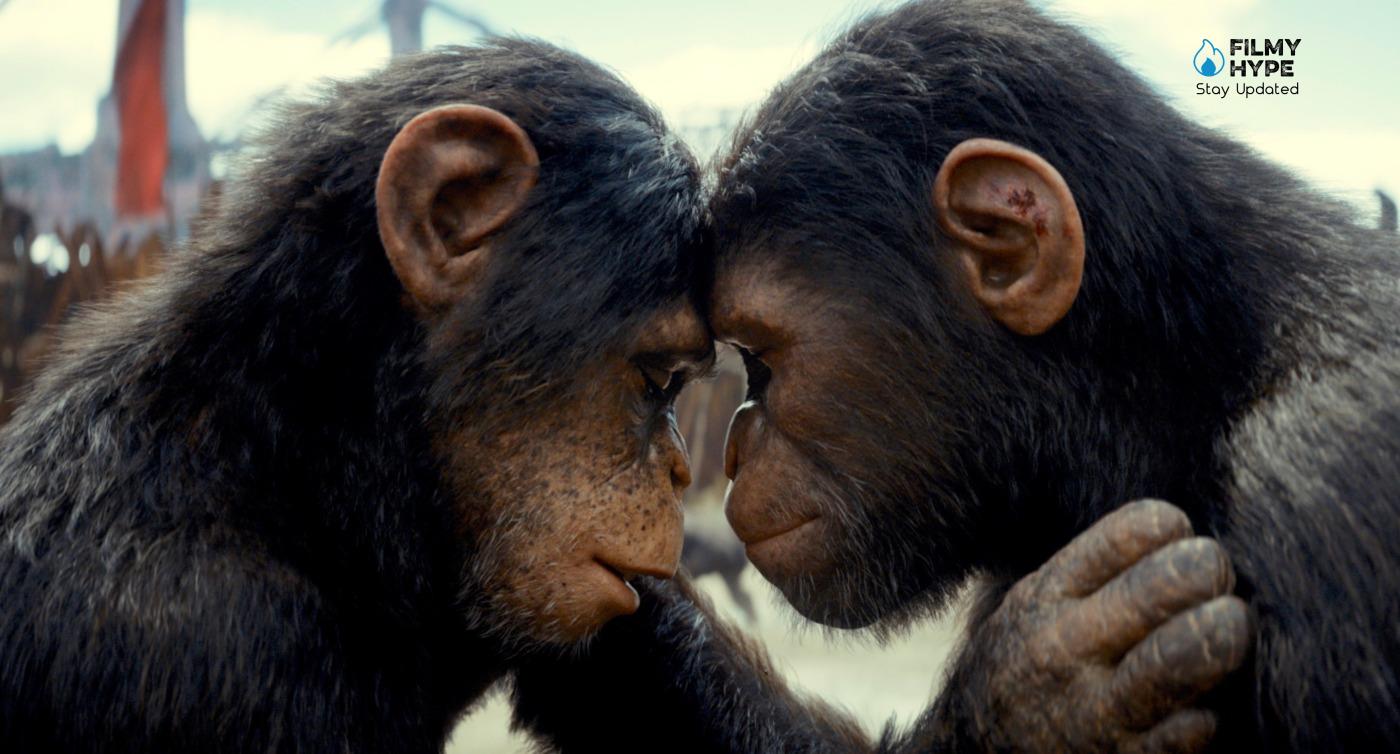
Setting aside the protagonists of the last chapters of the series, Kingdom of the Planet of the Apes revolves around Noa, a young chimpanzee who lives in the forest together with his family and his tribe, and specializes in training eagles. After learning falconry, however, Noa’s clan remained at an in all-in-all primordial stage: sure, the monkeys live in communities, know how to ride, and have developed a rather basic language, but they do not use firearms and have not created a complex society. The tribe of Noa is overturned by the arrival of a group of conquerors, led by Proximus, a bonobo monarch who has taken up the legacy – or rather, the myth – of Caesar and who has manipulated it, distorting it to its deepest meaning, to build a real Kingdom of monkeys, based on tyranny and the prevalence of the strongest.
While Noa’s tribe is put in chains, the protagonist manages to escape: his adventures between the hinterland and the western coast of the United States led him to meet Raka, an intellectual and erudite orangutan, the last representative of an ever-increasing “cult”. Linked to Caesar, who – unlike Proximus – carried forward his ideals in their purest form. On the other hand, it is no coincidence that one of the most iconic phrases of the chimpanzee played by Andy Serkis, “Apes together strong”, is the mantra of both Proximus and Raka and then also of Noa and his supporting characters: that of mystification of History and the exploitation of the powerful messages of the past is a tendency common to humans and primates. Speaking of humans: the basis of the kidnapping of Noa’s tribe is the accusation of having given refuge to a human on the run, whom the wildlings of Proximus are hunting throughout the forest.
The girl is soon named Nova by Raka, reminiscent of the character of the same name who appeared in The War. The viewer is naturally led to wonder why Proximus is looking for a caveman who is worthless and reduced – like all other human beings – to mutism by the same virus that made monkeys sentient. In reality, the girl hides a huge secret, which will certainly have repercussions for the future of the entire franchise: when we said that Kingdom of the Planet of the Apes lays the foundations for a new trilogy, we weren’t joking. Trying to avoid giving spoilers, know that the film directed by Wes Ball makes an intelligent reversal of the conditions of the Planet of the Apes, which in turn represents a reversal of reality: the what if? around which the saga revolves is that of the evolution of apes and the involution of humans, but now this cornerstone is crumbling, bringing humans back to the center of the narrative of what is much, much more than a simple war among monkeys.
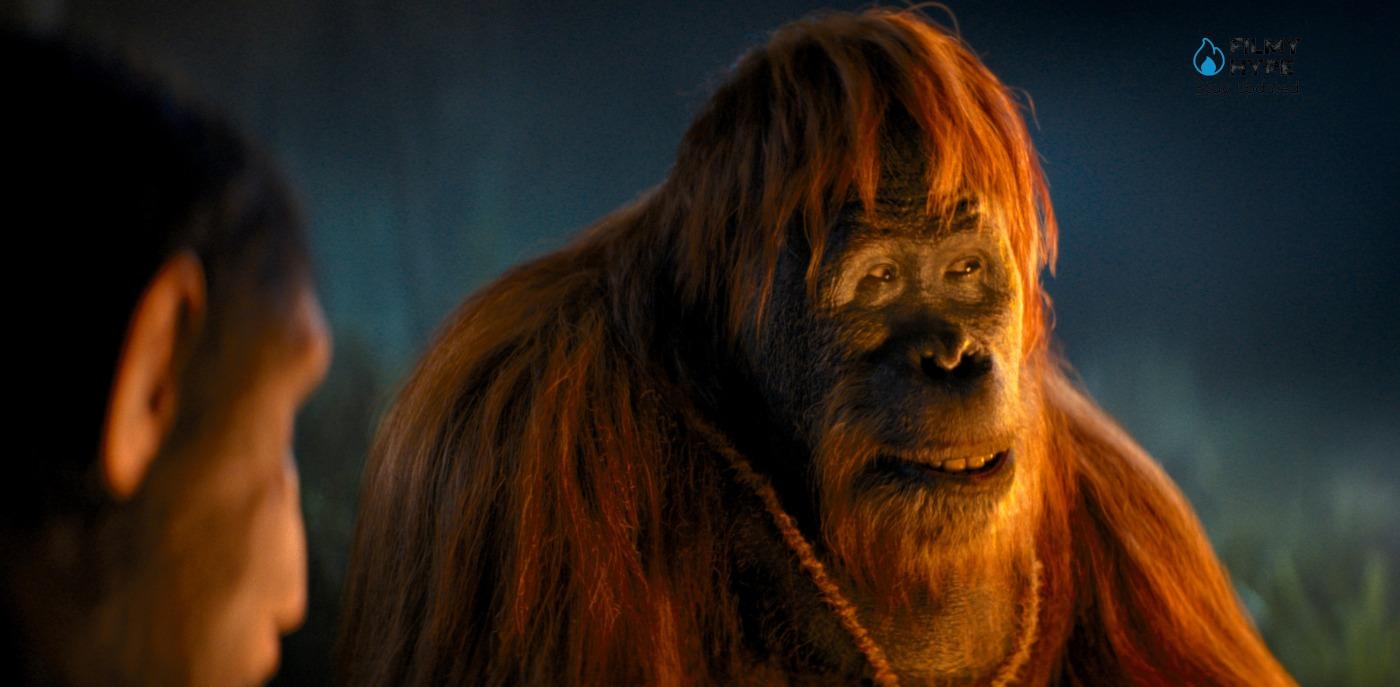
The theme of the memory of the past returns here even more strongly: Noa, Proximus, and their companions know that there was a past, before Caesar, in which humans dominated unchallenged and apes were locked in cages. No one wants this to happen again, but not everyone agrees on how to avoid it. The plot of Kingdom of the Planet of the Apes, as you may have understood, is full of events, genuinely exciting, and less predictable than expected. However, it is the construction of a now mature post-apocalyptic sci-fi world that is convincing: the Planet of the Apes series has never provided a particularly complex and intriguing worldbuilding to spectators, concentrating, especially with the more recent films, on the action aspects and neglecting the narrative (and lore) sector of the franchise.
Thanks to a decidedly wise choice – that of the time leap of about 300 years forward – Kingdom of the Planet of the Apes can instead courageously do what its predecessors only timidly hinted at: present a new world, completely different from the Earth we all know but still intimately connected to “our” present, focusing for a long time on the rules, laws and customs that govern it, as well as on the evolutionary lines of the populations – humans and animals – that inhabit it. Together with the reversal of the role of humans in the narrative that we talked about above, the strong concentration on the worldbuilding of the film makes the Planet even more intriguing than the Kingdom, in whose foundation a truly original question echoes: what would happen if the mythical ideal of the first sentient monkey was glorified and misrepresented at the same time?
What emerges is the post-apocalyptic delirium of a primate with the Crown, which draws liberally from many different imaginaries, both historical (from Roman classicism to the Middle Ages) and cinematographic and pop culture in general: alongside the completely original features, in fact, in the potentate of Proximus and the Planet explored by Noa we can see not only the legacy of films such as those of the Mad Max saga, but also of the videogame franchise of Horizon: Zero Dawn and Forbidden West. All these elements – which, let it be clear, are only hinted at and rarely become predominant – provide the spectator with the impression of being immersed in a possible and realistic (albeit distant) future, greatly facilitating immersion in the film and empathy with its simian protagonists. What the lore and the plot don’t do, then, is completed by the visual impact of Kingdom of the Planet of the Apes, which is as refined from a visual point of view as The War, if not even more: the transition from the direction of Matt Reeves to that of Wes Ball had no negative implications, on the contrary.
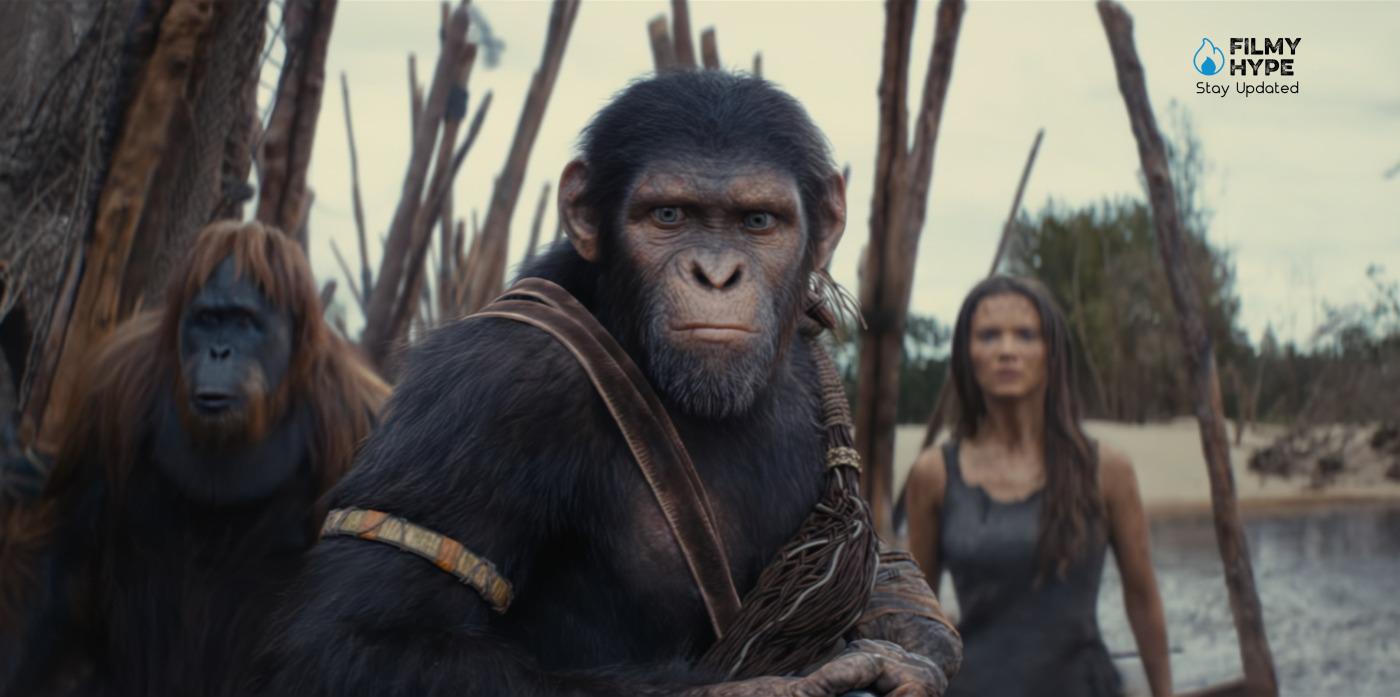
There are stylistic differences, but, as per tradition for American blockbusters, they are not too noticeable: the visual quality remains high, despite a greater predilection for wide shots, also due to the absence of attractive human actors such as Andy Serkis and Woody Harrelson, who would not have found the space they deserved in the story of Kingdom of the Planet of the Apes. If anything, the film confirms the upward trajectory of Wes Ball, whose direction is one of the reasons that made critics prefer the Maze Runner franchise to that of The Hunger Games. Together with the director, a large part of the technical cast has also changed between one episode and another of the saga, but here too the change seems to have occurred for the better, especially about photography: the management of the lights, in particular, has positively affected, although it was obtained with a heavy use of computer graphics.
Speaking of CGI: the realization of the monkeys and their movements is also excellent, as it was in the past. The progress in special effects in recent times (remember that seven years have passed since The War!) can be felt: although we cannot yet speak of total photographic realism, the monkey protagonists of the film interact with each other and with the environment that surrounds them with surprising naturalness. Orangutans on horseback and chimpanzees training eagles, fight scenes in the trees, on the banks of a pond, or underwater: Kingdom of the Planet of the Apes does not hold back from anything and almost seems to bask in its virtuosity technician. We would perhaps have preferred a more recognizable design for Noa and his supporting characters, all quite similar to each other: the idea was to make the protagonist resemble Caesar as much as possible and – potentially – make him grow and change throughout the film and the future productions, but ultimately the aesthetic choices adopted for Proximus and his minions remain the most iconic.
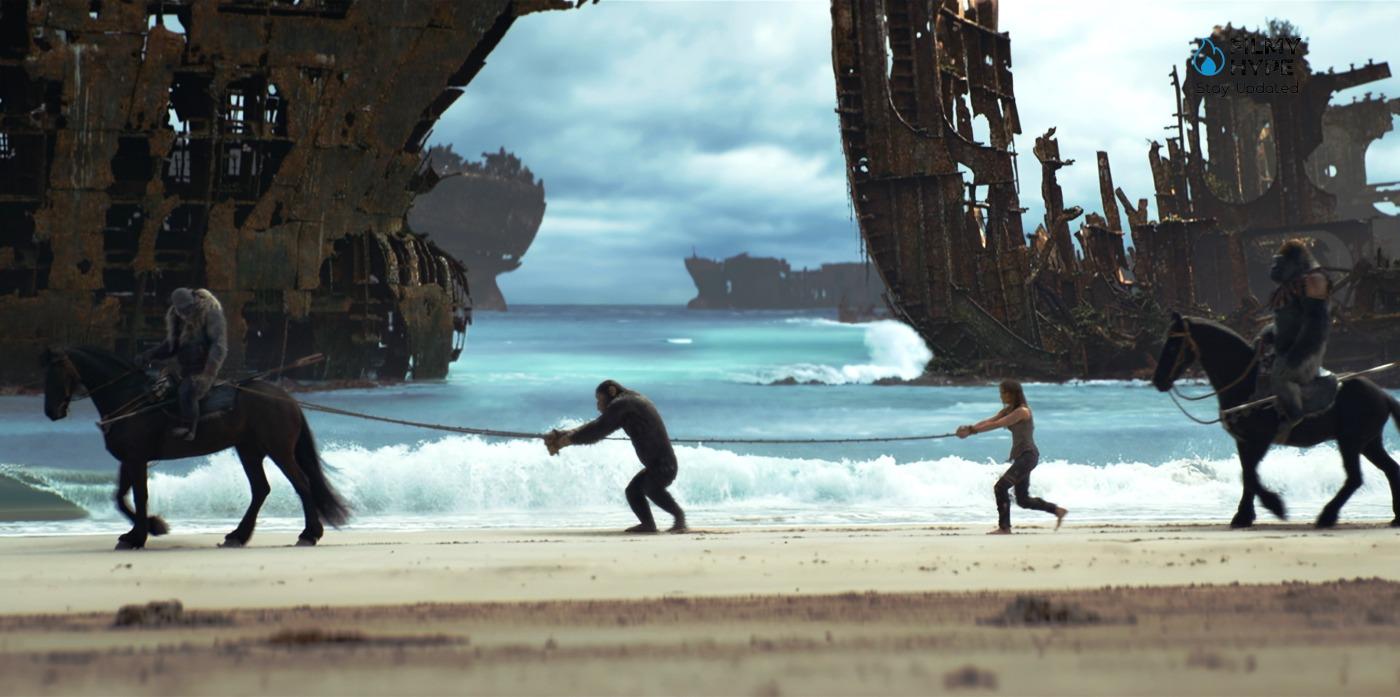
The charisma that Noa and the other “good guys” in the film do not possess in terms of design and costumes, however, they have from the point of view of characterization, which is quite deep and – even more importantly – extremely coherent with the general tone of the narrative and the world in which the film is set. That said, we must point out that the Kingdom of the Planet of the Apes isn’t perfect. The second half of the film is very different – too much, perhaps – from the first, both in terms of pace and as regards the general tone of the story told: the changes in setting become much less frequent and the action sequences take the upper hand. Despite their good workmanship, it is still a choice that perhaps could have been revised, also because the film lasts almost two and a half hours.
We’re certainly not saying that the film should have lasted less (on the contrary: it’s good that we decided to take time to delve deeper into the “new” Planet of the Apes), but a slightly more constant pace would have made the experience more enjoyable. In addition, it is quite clear that the second half was created more hastily than the first: some moments, which perhaps in the producers’ view were supposed to be the most “epic” and impactful of the production, are simple clichés, both in terms of staging and content. In short, the sequences which, in theory, should have been richer in pathos, end up appearing cloying and already seen. A small slip, which however certainly does not compromise a work of great quality.
Kingdom of the Planet of the Apes Review: The Last Words
Kingdom of the Planet of the Apes is one of the best films of the saga of which it is part. The plot is excellent, combining a rather simple main narrative line with many secondary developments that delve deeper into each character and provide many, many details about the world that has slowly been built over the last 300 years. The latter is by far the most interesting part of the film, which will therefore be all the more enjoyable for long-time fans of the franchise. Taken as an experience in itself, however, Kingdom of the Planet of the Apes is still excellent, thanks to a satisfying and majestic visual impact, textbook action sequences, and quality computer graphics. An excellent restart for an IP that has now accompanied the Seventh Art, through ups and downs, for more than half a century. With Kingdom of the Planet of the Apes, fans and enthusiasts return to a world that is very different from the one built in the previous trilogy, yet closely connected to it. The memory of the legendary feat accomplished by Caesar some time ago still hovers in the cultural consciousness of the apes who now seem to dominate everywhere, developing a true journey of discovery which, despite its being rather classic, captivates and convinces with the details of context and future possibilities.




